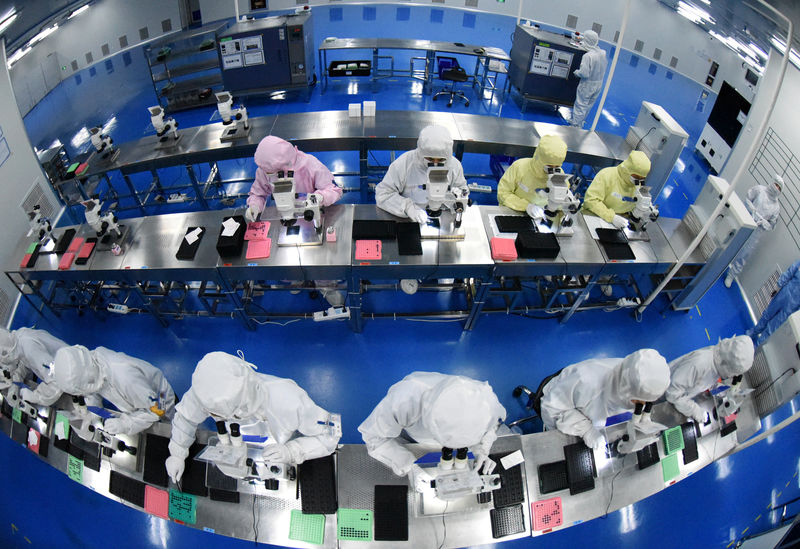BEIJING (Reuters) - China's factory activity is expected to have pulled back for a second straight month in June, according to a Reuters poll of analysts, as domestic business conditions worsened and the protracted Sino-U.S. trade war hit demand.
The official Purchasing Manager's Index (PMI) for June is expected to have edged up to 49.5 from May's reading of 49.4, according to the median forecast of 20 economists. However, that's still below the 50-point mark that separates expansion from contraction on a monthly basis.
A downbeat reading, along with somber indicators seen in May and April, would suggest economic growth is likely to slow this quarter and increase the prospect of further policy easing in the coming months.
"We expect factory activity to remain weak in the short run as domestic and overseas demand faltered, which was set to continue denting investment and output," said Tang Jianwei, a senior economist at Bank of Communications in Shanghai.
China's industrial output growth hit a more than 17-year low in May, dragged by exports while producer price inflation also slowed on faltering demand.
The official PMI and its sister survey on the services sector are released on Sunday, a day after leaders of the Group of 20 nations end their meeting in Osaka, Japan.
U.S. President Donald Trump and Chinese counterpart Xi Jinping are scheduled to hold talks at the summit, their first meeting since trade talks broke off in May.
The costly tariff dispute between the world's two largest economies has ignited deep fears about a global recession and pressured financial markets.
While China's exports unexpectedly returned to growth in May, analysts attributed that to front-loading of U.S.-bound exports to avoid new tariffs on about $300 billion of goods that Trump is threatening to impose.
Separately, China's Emerging Industries PMI (EPMI), which was jointly published by Chinese Academy of Science and Technology for Development and China Federation of Logistics & Purchasing and a barometer for the country's high-tech sector, fell to 50.2 in June from 52.4 in May.
To deal with the economic challenges, policymakers have released a range of stimulus measures and are expected to launch more, especially if U.S.-China trade negotiations fail to produce a workable agreement soon.
The People's Bank of China (PBOC) has already slashed RRR six times since early 2018 in a bid to turn around soft credit growth. It has also injected large amounts of liquidity into the financial system and guided short-term interest rates lower.
Premier Li Keqiang stoked expectations of more action this week, pledging measures to cut real interest rates on financing for small and micro firms.
Analysts at Capital Economics said in a note they expect the PBOC's 7-day reverse repo rate will decline by 75 basis points in the coming quarters, with the first cut potentially coming in the next few weeks.

A private business survey - the Caixin/Markit Manufacturing Purchasing Managers' Index (PMI) - which focuses more on small and medium-sized Chinese firms - is expected to show growth stalled last month, with the reading falling slightly to 50.0 from 50.2 in May. The Caixin manufacturing PMI will be released on Monday and its services PMI on Wednesday.